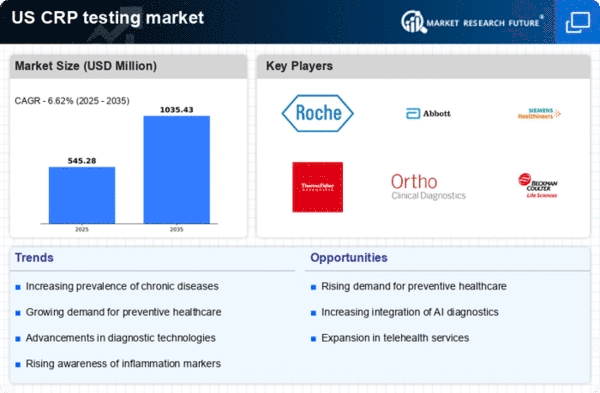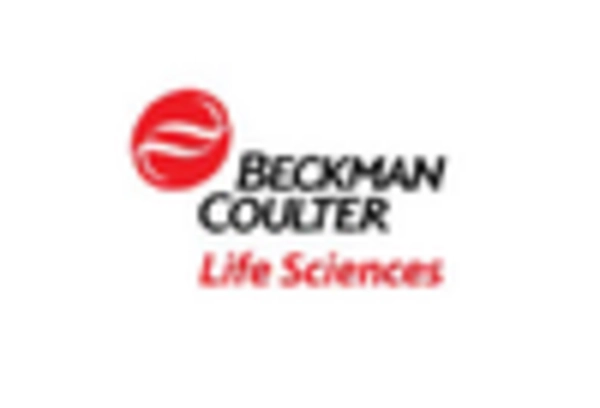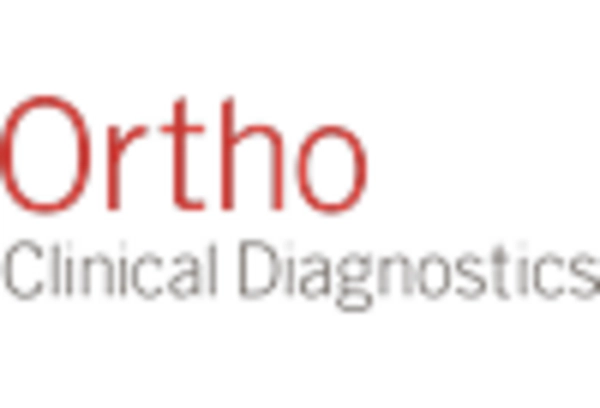Rising Incidence of Chronic Diseases
The increasing prevalence of chronic diseases such as cardiovascular disorders and diabetes in the US is a primary driver for the c reactive-protein-testing market. Chronic inflammation is often a key factor in these conditions, leading healthcare providers to utilize C-reactive protein testing as a diagnostic tool. According to recent data, nearly 60% of adults in the US are living with at least one chronic condition, which underscores the necessity for effective monitoring and management strategies. This trend is likely to propel the demand for CRP testing, as it aids in assessing inflammation levels and guiding treatment decisions. Consequently, the c reactive-protein-testing market is expected to experience substantial growth as healthcare systems increasingly prioritize early detection and preventive measures.
Increased Focus on Personalized Medicine
The growing emphasis on personalized medicine is influencing the c reactive-protein-testing market in the US. As healthcare shifts towards tailored treatment approaches, CRP testing is being recognized for its potential to provide valuable insights into individual patient profiles. By assessing inflammation levels, healthcare providers can better understand a patient's unique health status and customize treatment plans accordingly. This trend aligns with the broader movement towards precision medicine, which aims to optimize patient outcomes through targeted therapies. As personalized medicine continues to gain traction, the demand for CRP testing is expected to rise, further propelling the growth of the c reactive-protein-testing market.
Growing Awareness of Inflammatory Diseases
There is a notable increase in public and professional awareness regarding inflammatory diseases, which is significantly impacting the c reactive-protein-testing market. Educational campaigns and research publications have highlighted the role of inflammation in various health issues, prompting both patients and healthcare providers to seek CRP testing as a valuable diagnostic tool. This heightened awareness is reflected in the rising number of tests conducted annually, with estimates suggesting a growth rate of approximately 8% in testing frequency over the next few years. As individuals become more informed about the implications of inflammation on their health, the demand for CRP testing is likely to rise, further driving the market's expansion.
Technological Innovations in Testing Methods
Technological advancements in testing methodologies are playing a crucial role in shaping the c reactive-protein-testing market. Innovations such as point-of-care testing devices and automated laboratory systems are enhancing the efficiency and accuracy of CRP testing. These advancements not only reduce the time required for test results but also improve accessibility for patients in various healthcare settings. The market is likely to benefit from these innovations, as they facilitate quicker diagnosis and treatment decisions. Furthermore, the introduction of more sensitive and specific testing kits is expected to attract healthcare providers, thereby driving the overall growth of the c reactive-protein-testing market.
Integration of CRP Testing in Routine Check-ups
The integration of C-reactive protein testing into routine health check-ups is emerging as a significant driver for the c reactive-protein-testing market. Healthcare providers are increasingly recognizing the importance of assessing inflammation levels as part of comprehensive health evaluations. This trend is supported by clinical guidelines that recommend CRP testing for patients with risk factors for cardiovascular diseases. As a result, the market is witnessing a shift towards preventive healthcare, with CRP testing becoming a standard component of patient assessments. This shift is expected to enhance the market's growth trajectory, as more individuals undergo routine testing, thereby increasing the overall demand for CRP testing services.
















